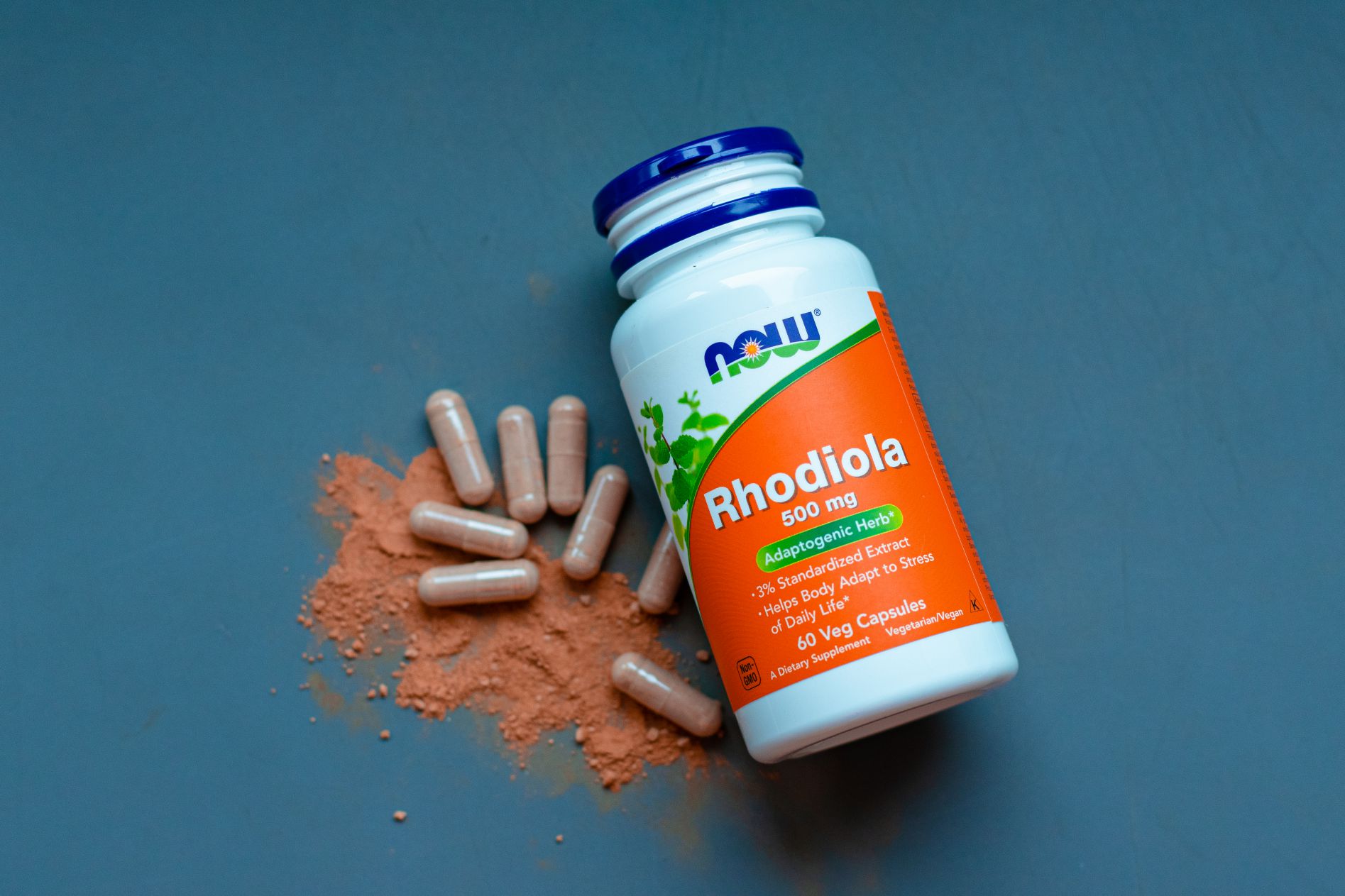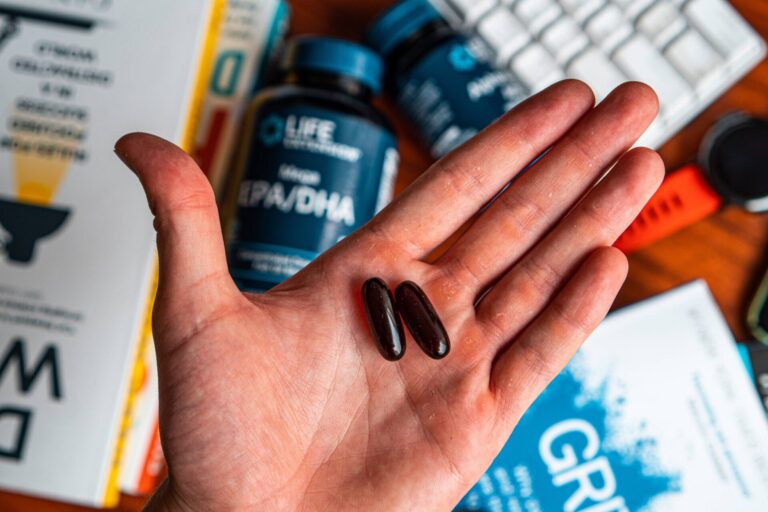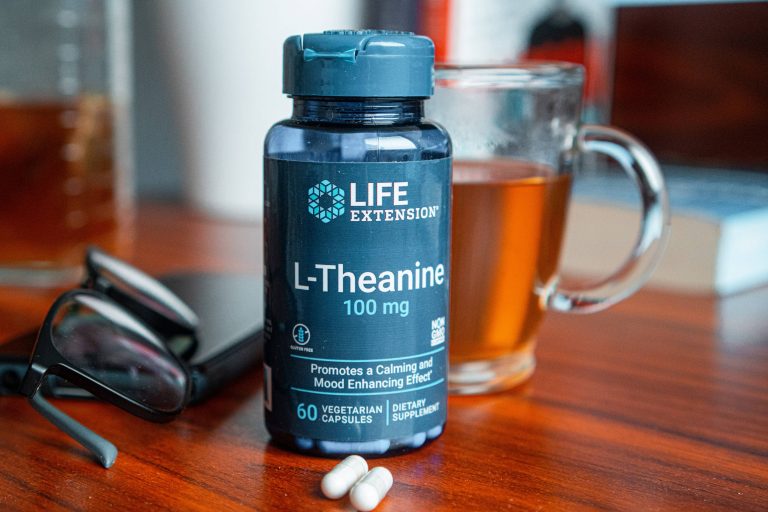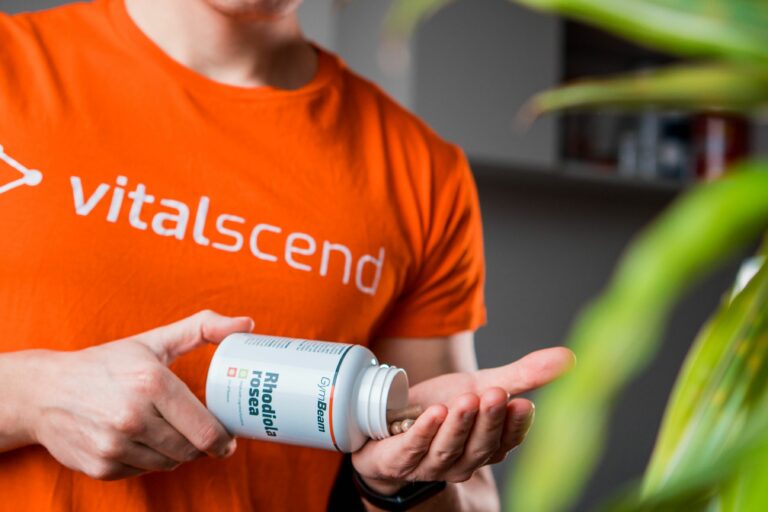7 Supplements for Stress, Anxiety, and Mood Enhancement
With so many tasks at hand, stress seems to be unavoidable. From relationship problems and financial instability to societal pressure and work demands, stress is ever-present. A complete stress-management protocol should take into account a variety of factors, such as sleep, environment, relationships, diet, and sun exposure, to name a few.
However, we can do quite a lot for our physiology by incorporating the right nutrients. Certain nutrients have been shown to modulate brain and CNS activity in a way that can be plausible for reducing stress and anxiety. By the end, you should have a great idea of what the most well-researched natural stress relievers are and how they work.
Understanding Stress and Anxiety
Stress is unavoidable, and sometimes good. There’s acute stress, which helps us be active, think clearly, and get tasks done. Then there’s chronic stress which is an accumulation of stressors during long periods. The latter is detrimental to our health, immunity, and well-being.
When stressors are presented, we act with a fight-or-flight response, where cortisol and adrenaline levels go up. Our heart rate increases, we start sweating, our breathing rate goes up, etc.
This is a natural physiological reaction to stress. None of it is necessarily negative, it’s essential to life. Whether we’re running from a lion [rarely these days], pushing through a HIIT workout, or hitting a cold plunge, this is the response we get.
The Physiology of Stress
Measuring nervous system activity, or the ratio of sympathetic to parasympathetic NS activity gives a great insight into one’s stress levels.
During times of stress, the sympathetic nervous system takes over. This is the fight-or-flight mechanism, a reaction to a quick threat. The sympathetic NS works to activate us, and our brains. Hyperactivated, triple-focused, and task-switching people have a lot of it. This is characteristic of anxiety.
On the other side, people with predominantly active parasympathetic, are calmer under stress. This is the healthier, rest and digest state, where heart rate and breathing rate slow down, sort of a deep regeneration.
This impacts heart rate variability, which is the variation in intervals between consecutive heartbeats. The higher it is, the more adaptable, and healthier one is. Sympathetic domination means lower HRV → so more stress, less healthy.
Chronic stress accumulated over time is linked to depression. In a way, the body can’t fight-or-flight anymore, so this results in a dampened response where we shut down certain brain functions – leading to lethargy, sadness, or apathy.
Conclusion
Increased stressors trigger the sympathetic NS which stimulates stress responses, increasing cortisol, and heart rate, and decreasing HRV. Greater parasympathetic activity is linked to lower stress, higher HRV, and better health.

Neurotransmitters in the Brain
Now that we understand that
- anxiety is linked to a hyperactivated state, driven by high cortisol and adrenaline
- depression is commonly a dampened state, or hypoactive brain with a dopamine and serotonin deficiency
We can start exploring how specific neurotransmitters affect our mood and mental state. This directly impacts stress, and how we perceive and react to it.
Certain nutrients have been found to affect the levels of key neurotransmitters in the brain. Modulating neurotransmitters seems to be an effective strategy for stress relief, anxiety reduction, and improving mood. So what are the main NTs and hormones we’ll talk about?
Dopamine
Serotonin
Cortisol & Adrenaline
GABA
A key player in the reward system of the brain that promotes feelings of pleasure and satisfaction. It promotes cognition, and movement and makes us feel motivated.
The so-called happiness hormone, it’s the precursor to melatonin, involved in mood regulation, sleep, and relaxation. Low levels are linked to depression and stress.
Primary stress hormones that prepare the body for action [fight-or-flight]. These increase heartbeat, breathing rate, and blood pressure and are essential for intense physical or cognitive tasks.
The key inhibitory neurotransmitter that reduces neuronal excitability. It activates the parasympathetic NS, thus playing a major role in reducing anxiety, stress, and fear.
Conclusion
The key 5 neurotransmitters involved in mood, stress, and anxiety are serotonin, dopamine, cortisol, adrenaline, and GABA.
Top 7 Supplements for Stress, Anxiety and Mood
Two notes before we dive deeper.
Neurology is complex and intertwined. Although there’s a fine line between stress, anxiety, and depression → these are all interconnected. In a way, improving mood by increasing dopamine [even with caffeine] will acutely give pleasure, thus dampening feelings of sadness. There isn’t a supplement for just one area when it comes to mood.
Nourishing the brain enhances its function. On a spectrum, we can lay out disease – health – performance. Enhancing brain health leads to better performance, elevating cognition. Malnourishing the brain degrades neural function, thus leading to [neurodegenerative] diseases.
What this means is stimulants that work acutely won’t cut it. The brain needs nourishment like vitamins, minerals, antioxidants, and healthy fats to properly function. Although the effects are slower and less pronounced, we focus on adaptogens and nutrients, because we deem them more sustainable.
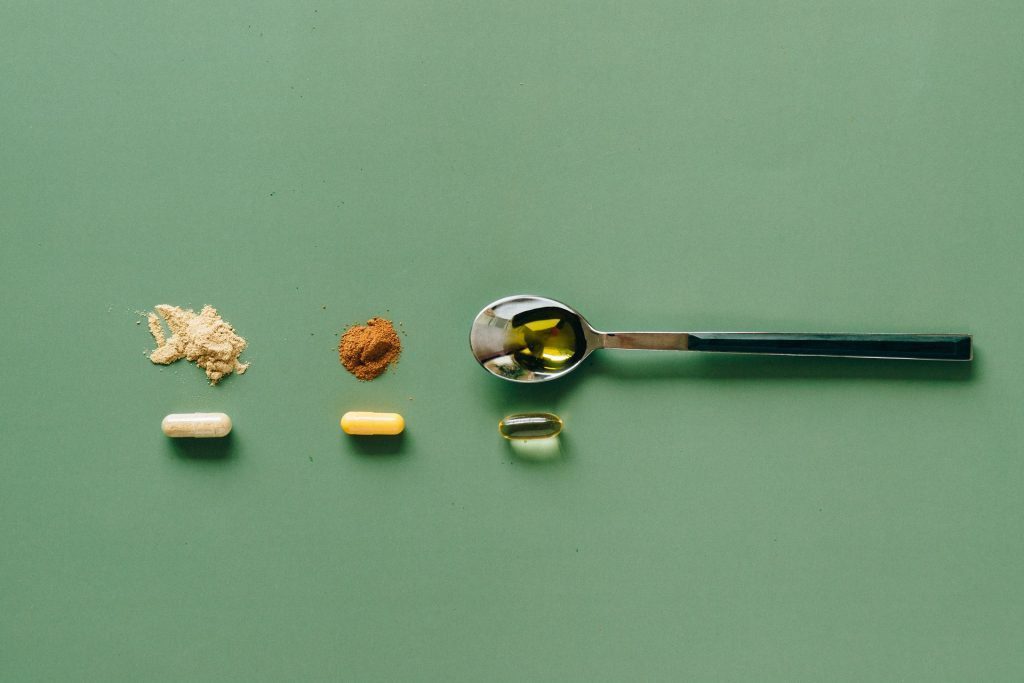
B-complex
B vitamins are essential water-soluble vitamins that perform numerous functions in the body. In particular, B vitamins as critical for energy production and proper functioning of the cell. They’re involved in the synthesis of numerous neurotransmitters and hormones that support optimal mood and brain function. (1) (2)
All B vitamins are important, but of particular importance for brain health and stress relief B6, B7, and B12 stand out.
- Bioting (B7) higher intake of biotin is associated with a lower prevalence of mood-related issues like anxiety, depression, and stress. (3)
- Vitamin B6 is crucial for modulating GABAergic function and synthesizing serotonin, which is the precursor to melatonin, the most important sleeping hormone that regulates the circadian cycle. (4) (5) (6)
- B12 or Cobalamin supports immune function, DNA synthesis, oxygen transport, and nerve cell function; all of these are important to prevent commonly known adrenal fatigue and fight stress.
Inadequate intake or vitamin B deficiency is known to lead to poor brain function and neurodegenerative diseases. It’s often associated with an imbalance in certain neurotransmitters, leading to anxiety and depression. (7) (8)
While the benefits aren’t as pronounced in healthy people with sufficient B-vitamin status, it can be beneficial for stress reduction in at-risk, stressed populations. (9)
Ashwagandha
Ashwagandha, commonly known as Withania somnifera, is an adaptogenic herb that has been used for centuries in traditional Ayurvedic medicine to help the body cope with stress and promote overall well-being. It’s one of the most well-researched adaptogenic herbs.
It executes its effects by modulating the hypothalamic-pituitary-adrenal (HPA) axis. A complex neuroendocrine system that regulates stress response by controlling cortisol secretion.
Here’s some research on Ashwagandha’s effects on stress, and mood.
- reduction in anxiety (HAM-A scale) and depression, anxiety, and stress (DASS-21) scores (10)
- potential prevention of neurological disorders, anxiety, and sleep disturbances (11)
- meta-analysis showed the anti-stress activity of WS, as it decreased cortisol production in stressed individuals (12)
- reduction in PSS or perceived stress score observed at 250 mg/day; reduced cortisol and improved sleep quality. (13)
- high-concentration extract reduced stress resistance and serum cortisol levels. (14)
Additionally, Ashwagandha extract are believed to modulate GABAergic and serotonergic pathways, important for parasympathetic activity. (15) In other words, it helps the body develop a stress-free state.
Rhodiola Rosea
Rhodiola Rosea is a potent adaptogen, particularly interesting in the sphere of stress-induced fatigue. It’s one of the most frequently mentioned natural herbs, with a ton of subjective backing. People who experience burnout love it.
So-called golden root, rhodiola has been long used in traditional medicine to reduce symptoms of stress-induced fatigue and depression. As with other adaptogens, it helps the body become more adaptive to stress. (16)
Where rhodiola shines is in treating stress-related complications, accumulated or chronic stress that leads to adrenal fatigue. (17) (18) It can help boost energy, reduce fatigue syndrome, and help prevent burnout. (19) (20)
Its anti-oxidant and anti-inflammatory activities are due to the potent bioactive compounds it possesses. Rhodiola contains rosavin, tyrosol, and salidroside, which can potentially reduce oxidative stress and improve cellular energy production, counteracting fatigue. (21)
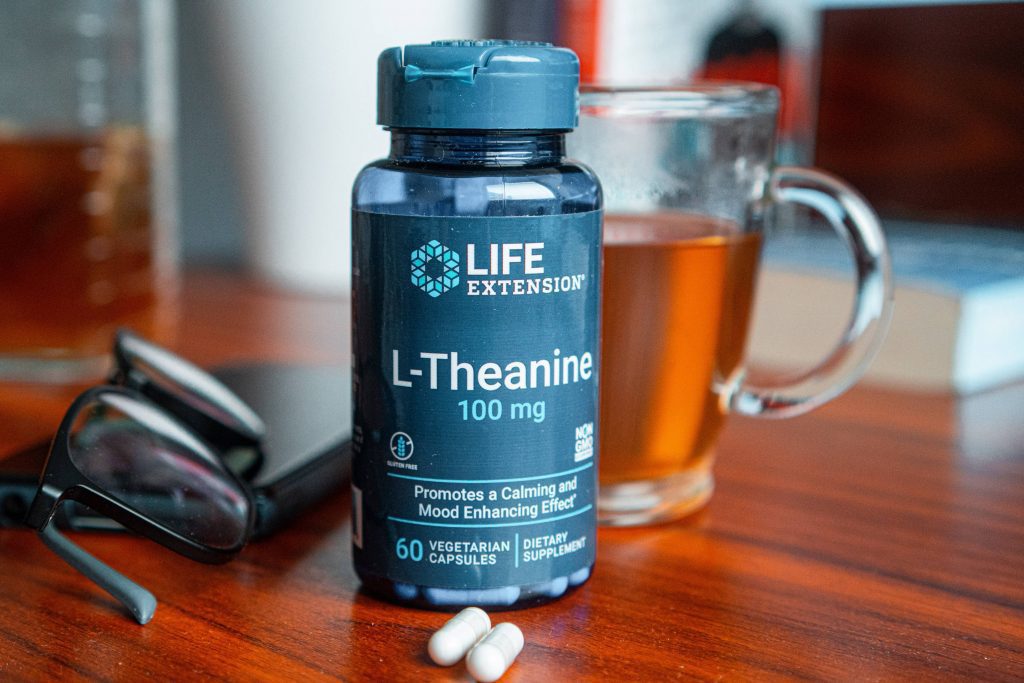
L-theanine
L-theanine is an amino acid with a potent calming effect. It’s mainly present in tea, responsible for the calming alertness-promoting effects of tea.
In the brain, activity is determined by the ratio of excitatory to inhibitory neurotransmitters. Glutamate is a key excitatory NT that stimulates the brain’s activity, involved in cognition, memory, and mood regulation.
L-theanine, due to its similar structure, competes for the glutamate receptors. Just as caffeine blocks adenosine, L-theanine blocks hyperactivity in the brain by crossing the blood-brain barrier and taking glutamate’s place. (22)
Research shows L-theanine has
- improved verbal fluency, and letter fluency, and has the potential to promote mental health in those with high stress or cognitive impairments. (23)
- L-theanine (200 mg), in combination with alpha GPC, chamomile, and PS reduces subjective stress and cortisol levels (24)
- It improved mood, relieved stress, and enhanced sleep. Additionally, it improved cognition by impacting reaction time, correct answers, and attention. (25)
- profound effect on attention and reaction time in people prone to high anxiety (26)
All in all, it seems that adding L-theanine can not just relieve stress, but improve cognitive function and mood as well. As a glutamate antagonist, it prevents overstimulation in the brain, further supporting GABA or inhibitory function. (27)
pro tip
Many love adding L-theanine to caffeine, as it smoothens its effects. Take matcha tea for example, which helps one develop relaxed alertness, as L-theanine is naturally present within. There are fewer jitters, energy crashes, and hyperactivity.
5-HTP
5-HTP or 5-hydroxytryptamine is a precursor to serotonin, the so-called happiness hormone. It’s much more than that. Serotonin impacts mood, and sleep and is essential for relaxation. Thus, modifying serotonergic function can greatly impact mood. (28)
The amino acid tryptophan, found in foods like meat, nuts, and seeds is critical to the synthesis of 5-HTP. Because of this, tryptophan deficiency correlates with depression, stress, and poor mood.
5-HTP can freely cross the blood-brain barrier and be converted into serotonin, whereas serotonin can’t. Increasing its levels can support synaptic serotonin function, thus reducing the risk of depression and poor mood. (29) (30) (31)
Research shows supplementing 5-HTP can
- increase plasma cortisol [stress hormone] levels, β-endorphin, and melatonin levels (32)
- in people with panic disorders, 200 mg of 5-HTP increased cortisol levels (33)
While acutely supplementing 5-HTP may not be a potent stress reliever per se, having enough tryptophan in the diet can support serotonin production.
This is important since serotonin deficiency leads to poor mood and degrades cognitive functions like reasoning and working memory. (34)
Additionally, some animal studies in mice show that 5-HTP may improve the composition of gut microbiota, which is essential to mood regulation. (35)
Magnesium
Magnesium is one of the key minerals in the body. It supports various physiological functions essential for life. It is a cofactor in >300 enzymatic reactions, essential for heart, nerve, and muscle function. (36)
Particularly, magnesium is important for the health of our brain and nervous system. It assists neural transmission, myelination, and synapse formation. Mg also helps regulate the function of various neurotransmitters like serotonin, dopamine, and acetylcholine. (37)
There’s strong evidence suggesting a link between magnesium and stress levels
- Mg deficiency is associated with stress – chronic fatigue, headache, cold, and physical stress (38)
- It plays a critical role in neuromuscular function and protects from excessive excitation, showcasing a potential to prevent neurodegenerative diseases (39)
- low magnesium levels correlate with higher stress levels, and both can affect each other (40)
- Mg is beneficial for subjective anxiety in anxiety-vulnerable samples (41)
- improvement in quality of life, depression, and anxiety scores after 8 weeks of magnesium and B6 supplementation. (42)
Mg is one of the most common additions for muscle cramps in athletes. It seems that adding magnesium, especially in those who lose a lot of electrolytes [athletes] is beneficial. It smoothens muscle function and relaxes the muscle, preventing twitches.
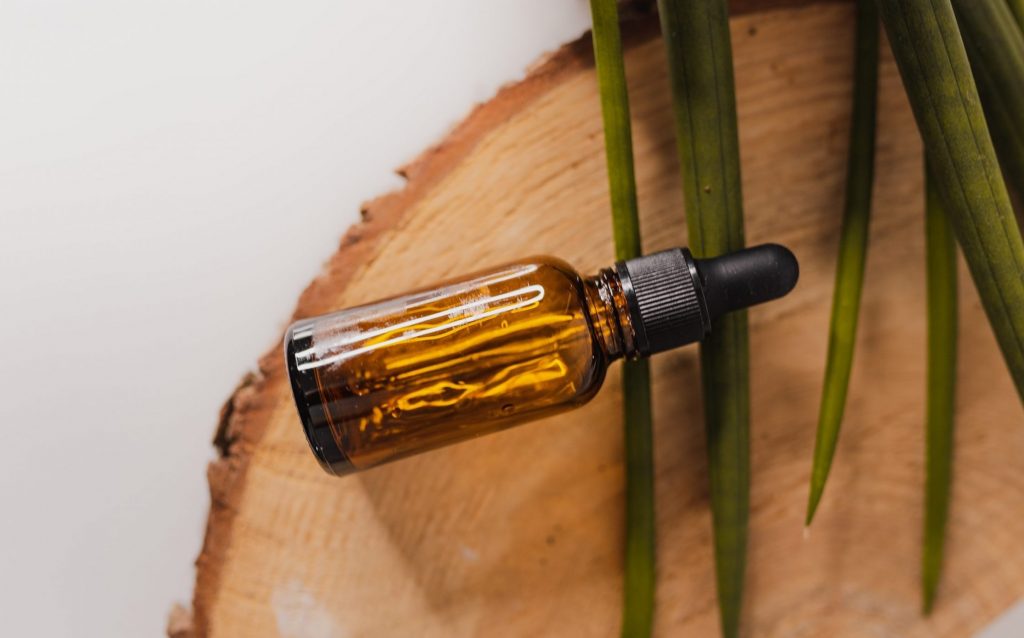
Eleuthero
Eleuthero, or Siberian ginseng is an adaptogenic herb used in traditional Chinese medicine for centuries. It’s believed to offer a wide range of health benefits related to energy, mitigating stress, and fatigue.
The research on eleuthero is ongoing, and we need more robust clinical trials in humans to conclude its effectiveness. So far, most of the research is on animal models. However, the subjective side is strong, as many people have reported great benefits, stress reduction, and an increase in stamina using it.
Like other adaptogens, eleuthero is thought to affect the HPA axis and modulate stress responses. It’s been one of the main weapons against adrenal fatigue, and alternative medicine has it → it works to balance the flow of energy by nourishing the glands.
Research: Eleuthero and Eleutherosides on Fatigue, Physical and Mental Performance
Some of its bioactive compounds like eleutherosides are responsible for the proposed immunity-boosting properties of eleuthero. (43)
In recreationally trained men, eleuthero supplementation of 8 weeks enhances endurance capacity, cardiovascular function, and glycogen sparing, thus improving performance [stamina]. (44)
Eleutheroside B or E can relieve fatigue and improve cognition, particularly memory. Tested in aged rats, these components improved learning and memory – potentially by enhancing acetylcholine synthesis in the hippocampus. (45)
In mice, under swimming-induced stress, eleuthero supplementation offset fatigue, improved corticosterone elevation, and reduced NK activity. (46)
How to manage stress
While managing stress through nourishing the brain and modulating key neurotransmitters isn’t a bad strategy, stress is much more. It’s a complex physiological response. We can’t avoid it, or control it, we can manage it.
By providing the proper nutrients, amino acids, herbs, and healthy fats we can be a step closer to a more optimal physiology for a stress-free body.
However, taking care of factors like sleep, sun exposure, breathing, and relationships can take us further on that path.
- Sun exposure can increase vitamin D levels, an essential precursor to serotonin, the happiness hormones
- Breathwork aka deep breathing [as in meditation] helps us calm our hyperactive brains and enhances vagal tone, thus deactivating the sympathetic nervous system
- Limiting exposure to toxic people and fixing one’s relationships offer far faster psychological relief
- Cold exposure, [cold plunge, cold shower] has been shown to, when done properly, with breathwork, increase vagal tone and reduce stress in the body, making us more resilient
Conclusion
- Stress is characterized by increased sympathetic NS activity, leading to faster heart and breathing rates, sweating, and lower HRV. Chronic accumulation of stress leads to burnout and degrades health.
- Some of the best strategies for managing stress are breathwork, meditation, sun exposure, communication, and sleep optimization.
- Neurotransmitters play a crucial role in mood regulation. Of particular importance are serotonin, dopamine, cortisol, adrenaline, choline, and GABA.
- Nourishing the brain by providing key nutrients, such as healthy fats [Omega 3] or B vitamins is critical to optimizing its function. This improves mood regulation, stress resistance, and cognitive performance. It’s the baseline
- Substances like caffeine [blocks adenosine] or l-theanine [blocks glutamate] help us modulate our brain’s activity levels. L-theanine is one of the most effective stress-relievers which helps us develop a mentally calm, alert state.
- Adaptogens like Rhodiola, Eleuthero, and Ashwagandha make us more stress-resilient by modulating the HPA-axis stress response. They’ve been shown to reduce cortisol levels and minimize chronic fatigue [burnout].

